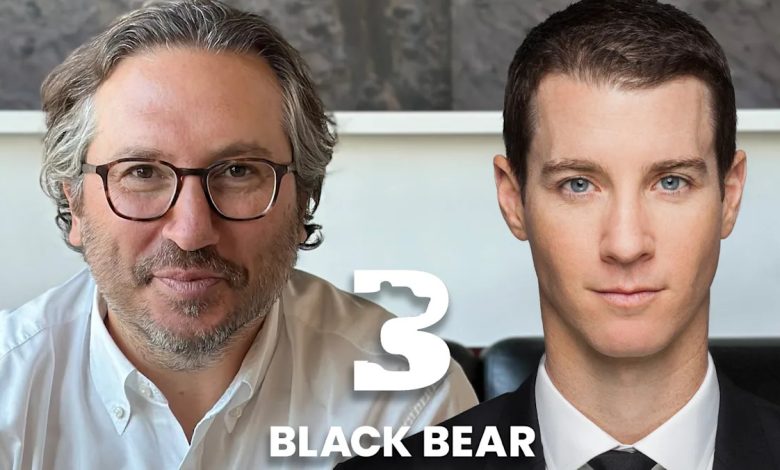Black Bear’s Teddy Schwarzman & Benjamin Kramer Lift Lid On New U.S. Distribution Division Ahead Of First Release ‘Christy’

EXCLUSIVE: Teddy Schwarzman’s Black Bear is gearing up for its first U.S. theatrical release this weekend in the shape of Sydney Sweeney boxing drama, Christy.
Ahead of the launch, we sat down with the indie studio’s owner Schwarzman and Benjamin Kramer, President of U.S. distribution, to discuss the company’s plans and bigger picture take on the market.
More from Deadline
In a world in which viable theatrical distribution partners are shrinking, Black Bear’s entree into the space is widely considered a boon for the ever-challenging indie sector. The Imitation Game outfit continues to operate UK and Canadian distribution and a thriving international sales arm in addition to its growing roster of in-house productions and management wing. Recent productions include Sing Sing and Train Dreams, while sales hits include Longlegs and The Monkey.
We understand the distribution team, which will release Black Bear movies and third party titles, will likely grow to 40-50 staff in coming months. Among significant first hires for the division have been former Lionsgate executive David Spitz as head of U.S. theatrical distribution.
DEADLINE: How are you feeling about where Black Bear is today?
TEDDY SCHWARZMAN: It has been fun to slowly and patiently see our expansion over time. We started in 2011 with two people in a 500-square-foot office in Tribeca. We’ve grown since then to more than 100 people between London, Toronto, and New York. We’re never trying to grow for the sake of growth but to grow into areas we’re passionate about.
We looked at what we had built internally and realized that we could control our own destiny a little bit more as it related to U.S. distribution. We saw an opportunity to partner with great filmmakers at a time when it felt like you were being asked to either be left of center or be a global streamer. We saw a bit of a hole in the marketplace, to be able to step in and do what we love to do, which is to work on movies with artistic integrity that are also commercially minded.
DEADLINE: When we last interviewed you a couple years ago you told us that you “love the idea of being close to U.S. distribution without having to put 10 times the amount of capital” into it. How much resource is Black Bear committing to this push?
SCHWARZMAN: If you’re going to build a proper U.S. studio, which has been our intention, it needs to come with substantial investment. We tend to look at Canada as being eight to 10% of North American box office. The capital that’s needed requires a major commitment. When we’ve decided to do something, it’s generally with the notion that we want to be best in breed.
DEADLINE: Will you bring in any outside investment or remain fully self-sufficient?
SCHWARZMAN: A lot of people are looking at mergers and acquisitions or looking at selling shares in their company. I think I saw a quote the other day that ‘everybody’s for sale’. We’re fortunate that Black Bear has always been able to finance from within and doesn’t need third parties in order to scale to get to the ambitions we have.
DEADLINE: What kind of headcount are you looking at for the distribution operation?
BENJAMIN KRAMER: We mean to be competitively sized with other distributors in our field who can take a film of any capacity, from an awards prestige-driven movie to a wide release commercial play.
SCHWARZMAN: We want to release 10 to 12 films a year. We have a substantial investment into theatrical distribution, marketing, publicity, digital, post theatrical optimization, and other areas. We need to be able to prep for a 3000+ screen release action film and a specialty prestige release. We look at some of the distributors that have come and gone in the past, and sometimes that is due to oversized headcount or how top heavy they are. We’ve tried to learn from STX, Paramount Vantage, Warner Independent, the list goes on and on. We want a marketing, publicity and distribution rollout on a film that can rival a major studio, while at the same time having a level of infrastructure that is more efficient.
DEADLINE: How far are you from announcing your head of marketing?
SCHWARZMAN: We’ve spoken to some great people. We currently have a fully staffed marketing and publicity department but we haven’t announced all those hires yet.
DEADLINE: How far are you from your first third party acquisition?
KRAMER: It could be AFM. We looked at projects at Toronto.
SCHWARZMAN: We want to be aggressive as it relates to upcoming acquisitions of third party projects, while we also believe strongly in our own slate.
DEADLINE: Someone mused to me the other day to what extent the launch of the distribution arm was a sign that there aren’t enough distributors for the types of movies Black Bear is making versus this being conceived as a lucrative business proposition. What would you say to them?
KRAMER: I think that’s a pretty limiting choice of options, saying it has to be one of those or the other. This is a natural outgrowth of Black Bear’s business. Rather than saying it has to be about Black Bear movies, or some strictly financial bigger picture play, it’s really about what is best for the films. We’ve had the opportunity to witness a number of distributors handle our films, some who have been valued partners, and to learn from that. A distribution company is the sensible thing to do, both financially, but also for the individual films.
DEADLINE: Your first releases are…
KRAMER: We have dated Jason Statham movie Shelter for January 30. Tuner is also coming but isn’t dated. The other film we can say we’ll be releasing but haven’t dated is The Rivals of Amziah King. If you look at the Black Bear slate that’ll give you a pretty good idea of the films we’ll be doing…
DEADLINE: I’m interested in The Rivals of Amziah King. That film has some strong advocates. Someone I spoke to the other day said they thought it could have been an awards movie…
KRAMER: It definitely has awards potential. It’s a special film that requires and demands a unique campaign that is as idiosyncratic and iconic as the film is. We love it and are figuring out now what the best time and release method is for it.
SCHWARZMAN: Andrew Patterson is one of the most exciting directors working today. Matthew McConaughey delivers an iconic performance that is more than a return to form and Angelina LookingGlass is a true breakout. We want to create a moment for this film outside the noise of this fall, but that doesn’t mean that there aren’t substantial awards opportunities for it down the line, whether that be Gotham, Spirit or Academy. It’s a singular film.
DEADLINE: What does success look like on Christy?

Sydney Sweeney in ‘Christy’
SCHWARZMAN: Christy was made for a reasonable budget relative to other sports movies that you hear about. There’s a lot of talk about the underperformance of Smashing Machine, which we appreciated as a film. Christie was made for under 20M, closer to 15M. Our exposure, from a U.S. standpoint, is modest. That said, I think what we want to make sure is that people understand what an incredibly singular performance Sydney Sweeney provides. It’s transformation both physically and emotionally. Coming out of Toronto, she was immediately put into awards consideration. Audiences have really sparked to it.
DEADLINE: How many screens will that reach?
SCHWARZMAN: It should be on more than 2,000.
DEADLINE: You’re selling Guy Ritchie’s movies In The Grey and Wife And Dog. Will you have to bid on those or will they automatically become Black Bear movies in the U.S.?
SCHWARZMAN: No comment.
DEADLINE: Are they Black Bear productions?
SCHWARZMAN: No comment.
DEADLINE: Ben, you recently joined from CAA Media Finance. To what extent will you acquire CAA packages or packages from other agencies?
KRAMER: We are open and available to the most inspiring and filmmaker-driven audience pleasing films in the market wherever they come from.
DEADLINE: Are there any passion projects on the slate that you’re particularly keen to re-energise? I’m thinking about projects like 77 Blackout, King of Heists or your sci-fi with Dede Gardner…
KRAMER: They’re all projects we are passionate about, and they’re all films that are close to our heart.
DEADLINE: How are you feeling about next week’s American Film Market?
SCHWARZMAN: We’re looking forward to opportunities. It seems a little light but there’s often a surge of projects just before the market. We want to be active and aggressive where it makes sense.
DEADLINE: In the announcement of Ben’s hire, Teddy, you said he has a keen understanding for what works for U.S. audiences. Ben, what is working for U.S. audiences?
KRAMER: Authenticity and originality; filmmakers executing at the highest level and working with great material, great cast and great producers to bring wholly original stories; those projects that are meeting an audience where they are and surprising and delighting them…
DEADLINE: Is it treacherous out there? As you alluded to previously, the path is littered with the husks of formerly ambitious distributors...
SCHWARZMAN: Over the last 10 years the floor on theatrical performance has dropped out, so distributors need to be incredibly careful about project selection and assumptions at acquisition stage. There are fewer and fewer films that are true theatrical events. It becomes harder and harder to make sure that you are both developing, acquiring and releasing films that can break through and connect. But that is our job. We are still seeing examples this year of that happening. Prior to Covid, we thought that the most reliable audiences were older audiences who continued to love the theatrical experience, and that we had lost a whole generation of young teens and 20 somethings. But now, post Covid, you’re seeing that younger demo is the most reliable and that they love the shared, communal experience, and it’s the older audience that have discovered how to work their Netflix accounts.
DEADLINE: There was a lot of talk at the recent Zurich Summit we attended about a hostile political climate impacting the industry: Filmmakers not being able to get content made, some films not being able to get released, Trump’s tariffs looming, Jimmy Kimmel pulled off air. To what extent do you guys see that as a challenge right now for the sector?
SCHWARZMAN: I don’t think it’s impacting us. We aren’t inherently political in the work that we are bringing to life. I think we run into trouble when we try to put our politics onto the rest of America.
DEADLINE: That said, Trump’s tariffs seem to be creating a large amount of concern in the broader industry. He’s repeated his threat to impose a 100% tariff on all films not made in the U.S., claiming the U.S. industry has been stolen by other countries. Considering you have outposts in Canada and the UK and work on films that can come from anywhere, what does that threat mean to you?
SCHWARZMAN: We’re continuing to monitor what’s happening from the current administration. I believe this is the second time that the concept of tariffs for ‘runaway productions’ has been mentioned.
DEADLINE: Presumably, like many, you’d welcome stronger filming incentives in the U.S.?
SCHWARZMAN: The cost of production has only continued to go up while the environment for releasing has become more difficult. You’re seeing a number of productions go overseas for the lower cost of below the line. We’re strong believers in the American workforce and in the U.S. film industry’s incredible crew base. Black Bear was involved in lobbying for a greater California tax credit, and we were really happy to see that get implemented.
DEADLINE: Black Bear recently worked on the Saudi film 7 Dogs, a high-profile action project from the region backed by the Saudi government. Are you looking to do more with the Saudis or in the Middle East region?
SCHWARZMAN: That project wasn’t a Black Bear production. We provided production services only.
DEADLINE: A24 launched an AI division a while ago. Is that something Black Bear could be interested in?
SCHWARZMAN: We’re not a tech company. We’re focused on supporting filmmakers in telling curated stories that we believe can reach audiences. That’s our focus.
DEADLINE: Are you interested in first look deals with creatives?
SCHWARZMAN: We are fostering relationships with our filmmakers but first look deals aren’t a core part of our business right now.
DEADLINE: Are there other verticals you’re looking to launch beyond U.S. distribution?
SCHWARZMAN: We don’t grow for the sake of growth. We have a number of growth ideas and how we can complement our vertically integrated studio, but the goal is to first prove the concept in the areas that we’re in.
DEADLINE: There’s always great interest in people’s family connections. Your dad Stephen A. Schwarzman is a very prominent U.S. businessman who has also played a role in American politics. Do you ever talk with him about the direction of Black Bear or about business strategy?
SCHWARZMAN: No comment.

Best of Deadline
Sign up for Deadline’s Newsletter. For the latest news, follow us on Facebook, Twitter, and Instagram.



